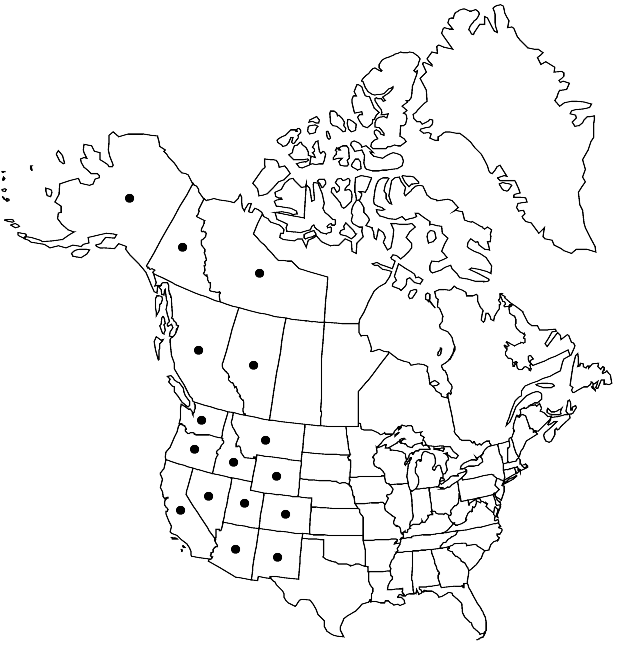Difference between revisions of "Draba albertina"
Pittonia 4: 312. 1901.
FNA>Volume Importer |
imported>Volume Importer |
||
| (2 intermediate revisions by 2 users not shown) | |||
| Line 6: | Line 6: | ||
|place=4: 312. 1901 | |place=4: 312. 1901 | ||
|year=1901 | |year=1901 | ||
| + | }} | ||
| + | |special_status={{Treatment/ID/Special_status | ||
| + | |code=E | ||
| + | |label=Endemic | ||
}} | }} | ||
|basionyms= | |basionyms= | ||
| Line 74: | Line 78: | ||
|publication title=Pittonia | |publication title=Pittonia | ||
|publication year=1901 | |publication year=1901 | ||
| − | |special status= | + | |special status=Endemic |
| − | |source xml=https:// | + | |source xml=https://bitbucket.org/aafc-mbb/fna-data-curation/src/2e0870ddd59836b60bcf96646a41e87ea5a5943a/coarse_grained_fna_xml/V7/V7_363.xml |
|tribe=Brassicaceae tribe Arabideae | |tribe=Brassicaceae tribe Arabideae | ||
|genus=Draba | |genus=Draba | ||
Latest revision as of 22:33, 5 November 2020
Annuals, biennials, or perennials; caudex (or base) simple or branched (poorly developed); rarely scapose. Stems branched distally, (0.3–)0.5–3(–4.2) dm, pubescent proximally, often glabrous distally, trichomes simple, 0.1–1 mm, sometimes with fewer, stalked, 2-rayed ones. Basal leaves rosulate; shortly petiolate; petiole (0–0.5 cm), ciliate throughout; blade obovate to oblanceolate or linear-lanceolate, (0.3–)1–2.8(–3.5) cm × (1–)2–6(–9) mm, margins entire or denticulate, (ciliate, trichomes simple, 0.4–1 mm), surfaces usually pubescent, abaxially with stalked, 2–4-rayed trichomes, 0.05–0.4(–0.5) mm, (rarely with simple trichomes along midvein), adaxially with simple trichomes sometimes also with 2-rayed ones, 0.07–0.4 mm, rarely glabrous. Cauline leaves (0 or) 1–3(–5); sessile; blade lanceolate to elliptic or ovate, margins entire or denticulate, surfaces pubescent as basal. Racemes (2–)6–30(–50)-flowered, ebracteate, elongated in fruit; rachis straight or, rarely, flexuous, glabrous. Fruiting pedicels divaricate-ascending or horizontal, (not appressed to rachis), usually straight, rarely curved upward, (3–)5–14(–16) mm (subequaling or shorter than fruit), usually glabrous, rarely sparsely puberulent. Flowers (chasmogamous, petaliferous); sepals ovate, 1.4–2.1 mm, glabrous or sparsely pubescent, (trichomes simple); petals yellow, spatulate to oblanceolate, 2–3.2 × 0.7–1.2 mm; anthers ovate, 0.15–0.25 mm. Fruits lanceolate to narrowly elliptic or linear, plane, flattened, (4–)6–12(–15) × (1–)1.4–2.1 mm; valves glabrous; ovules (20–)24–38(–44) per ovary; style 0.01–0.12 mm. Seeds oblong, 0.7–1 × 0.4–0.5 mm. 2n = 24.
Phenology: Flowering Jun–Aug.
Habitat: Open woodlands, pine forests, meadows, rocky knolls, alpine slopes, stream banks, disturbed areas
Elevation: 900-3700 m
Distribution

Alta., B.C., N.W.T., Yukon, Alaska, Ariz., Calif., Colo., Idaho, Mont., Nev., N.Mex., Oreg., Utah, Wash., Wyo.
Discussion
O. E. Schulz (1927) and C. L. Hitchcock (1941) confused the limits of Draba albertina, D. crassifolia, and D. stenoloba; the latter author treated the first two species as conspecific. G. A. Mulligan (1975) demonstrated that the three taxa are chromosomally and morphologically distinct (see D. crassifolia and D. stenoloba for differences from D. albertina). The ranges of D. albertina and D. crassifolia overlap extensively, and occasional sterile hybrids are encountered.
The Alaskan record of Draba albertina is based on Minard 4 (ALA), collected on the northern coast of Afognak Island (58°22’N, 152°28’W). The record from New Mexico is based on O’Kane & Hedin 3871 (ISTC, SJC), collected in Chuska Mountains (36°8’11”N, 108°54’19”W).
Selected References
None.